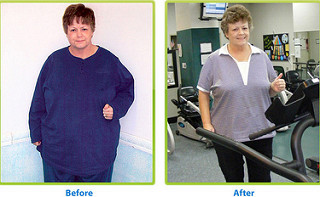Yes, Your Stomach Actually Shrinks When You Diet!
A reader and client has written in asking, “Does my stomach actually shrink after a few weeks of eating less, or is it all in my imagination?” Years ago, it was thought that your stomach doesn't really shrink, it only feels like it. With the current research, much to my surprise, the answer is yes, your stomach actually does shrink!
(The author is the psychotherapist who lost 140 lbs. when he discovered Therapeutic Psychogenics, and he’s kept it off for over 25 years. He has helped thousands to lose weight permanently with this approach. More about it at www.TheAndersonMethod.com)
For years, the answer from all the experts has always been “no”, your stomach does not actually shrink. My staff dietitians and consulting physicians have always told me (most still do) that this is an “old wives’ tale”, a myth that came about because after a while of eating less, we seem to get used to it. They said that the ravenous hunger that you got when you first “dieted” goes away after a few days, but it wasn’t from your stomach actually getting smaller. ”It’s a matter of habituation”, they said. You also get a full feeling on less food than before, but ”it’s not actually your stomach physically shrinking. The new experience becomes our new normal and we get used to it”. According to them, our digestive system and appestat adjust to the new level of consumption, and now, when we’ve had the new normal amount or new normal of going without, our brain gives us the same messages it used to give us, but on less food. But the stomach physically shrinking? “No”, they scoffed, “just another silly myth lay people believe”.
It turns out they were wrong, at least about the stomach shrinking part. Here’s the scoop: Researchers at Columbia University College of Physicians and Surgeons and the Department of Medicine and Psychiatry at St. Lukes-Roosevelt Hospital have actually measured the size of the stomachs of people before and after 4 weeks of eating less. They found that dieters had their stomachs shrink by 27-36%!
They inserted balloons into the empty stomachs of 25 obese volunteers and then filled them with water to measure the volume the stomach would hold. Then, a group of 14 of them went on restricted diets, reducing the amount of food they ate, and 9 did not. At the end of 4 weeks, they repeated the measuring procedure using the balloons. The non-dieters had no change in the volume their stomachs would hold, but the dieters’ stomachs would not hold what they used to. The volume their stomachs’ would hold had shrunk by 27 to 36%. So, its true, your stomach actually does shrink after you eat less for a while.
Of course, the reason for the change in hunger and satiety related to how much we eat is not really important. What is really important is using this fact to help us lose weight permanently instead of letting it interfere.
For instance, when I was chronically overweight and constantly failing at weight loss, the so-called “experts” told me to eat when I was hungry and stop when I was full. The problem with this was that I seemed to be hungry most of the time, and I never felt full on the amounts of food they gave me. Then, they criticized me for the way I felt, basically saying that it was my fault that I wasn’t like them. No wonder they couldn’t help me. They had no idea what the problem was. They didn’t realize that I experienced life differently, in a way they were not aware of. Their “solution” only worked for people without the problem.
I have discovered how to solve my weight problem, how to lose weight permanently, and how to help other chronically overweight and obese people do the same. One of the things we do is accept that certain things that are natural to us might not be normal to people who do not have our weight problem. These are some things it might be useful for you to accept:
1) It’s normal to feel hungry and have cravings even when we’ve had plenty to eat. To keep from being overweight, we need to develop the ability to abstain from eating in the face of hunger and cravings, rather than insist on finding ways to satisfy them, or let them be an excuse to justify overeating.
2) If we persist in eating less (I call it “undereating”), it will get easier as time goes by, because we will have less hunger and cravings after a few days of eating less, as long as we continue in our undereating.
3) If we eat more, for instance on an indulgent weekend or vacation, we will have a day or two of perhaps extreme hunger and craving when we return to undereating (our stomach shrank?). Then, after a few days of undereating, it will get easier again. I used to tell dietitians, “The more I eat, the more I need to eat” while they insisted that the more I ate, the less need I should feel. Now, after working with thousands of other people with weight problems, I find that my clients’ experience is overwhelmingly more like mine than the dietitians’. To be successful, we need to develop the ability to cut back and eat less routinely for the rest of our lives. We need to be willing to accept that getting good at this skill is very worthwhile in improving our lives and our happiness.
4) If we develop habits of eating whenever we feel like it, and want to have feelings of ”fullness” when we eat, we will become overweight. The way things work, if we did that, it would require more and more all the time to satisfy those feelings. It’s stunningly similar to the phenomenon of tolerance with drug addition, where more and more of the drug is needed to achieve the desired effect. The dietitians just don’t seem to understand this, probably because it doesn’t happen to them. For us to be successful, we need to develop habits where we don’t eat every time we’re hungry, where we don’t eat until we’re full all the time.
This is by no means a complete idea of what you need to know in order to solve your weight problem. That would take a book, and in fact, there is a book, The Anderson Method, that describes the program of therapy I provide, that I’m also training other therapists to provide.
I was an overweight failure at diets and exercise for 25 years, the “fat kid” in school, and over 300 lbs as an adult. Fortunately,because of what I learned with all that trial and error, combined with what I learned as an addiction counselor and behavior therapist, I discovered Therapeutic Psychogenics, lost 140 lbs. along with my obesity problems, and I’ve maintained that success for over 25 years. I’ve helped thousands to duplicate my success and now I’m training other therapists. You can learn more about it and my book at my website: www.TheAndersonMethod.com
-
Why Hypnosis Works For Weight Loss
Chances are you have heard about someone
-
A Couple Of Fast Ways To Lose Weight Within A Week Or Two
Exercise is about doing. Its important t
-
Double Chin Exercise
Having a double chin can be one of the worst indicators of being overw
-
Effective Weight Dieting
Some of them have very positive results
-
A Beginner’s Guideline Of The HCG Diet Regime
We all know how weight loss is simpler said than carried out. It
-
Close Kept Secrets To Weight Loss Lesson 11
You are the GREATEST, arent you? You are focusing on you and attracti
- DON'T MISS
- Muscle Gaining Secrets from Flat to Fabulous
- Six Steps For Rapid Weight Loss
- Diet Herbs: Cornsilk, Cranberry, Dandelion And Ephedra - Ephedrine
- Lose Weight By Going Through Weight Loss Success Stories
- Have the Latest news On African Mango Extract Review Before You’re Too Late
- 5 Tips to not getting fat while you are on holiday
- Snacking Fear Greed And The Gastric Bypass Tool
- How to Make Healthier Choices While Eating Out
- Phen375 Review - Can You Really Lose 20 Pounds In A Month?
- 5 Everyday Habits That Can Harm Your Memory and Other Hot Health Stories for the Week




